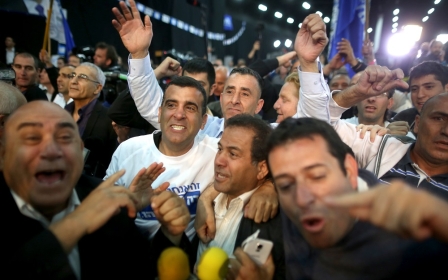Netanyahu: The man who came back from the dead

Even in his wildest dreams, Prime Minister Benjamin Netanyahu did not imagine he would wake up this morning to see his Likud party with a crushing five to six seats lead over Isaac Herzog’s Zionist Camp. Only five days ago, the polls gave him 20 or 22 seats. He was considered a political has-been and even his closest aids, and maybe he himself, lost all hope. Now he has come back from the dead with 29 or even 30 seats and a comfortable right-wing coalition in the making.
These election results will certainly fortify Netanyahu's fame as the most able politician in Israel's history, his reputation as a "magician" who knows how to deliver himself from very difficult situations. This time, he did it all alone. A four-day blitz of uninterrupted interviews in which he was not ashamed to implore all right-wing voters to come to his rescue. And they came to polls in huge numbers, surprising even themselves.
From its start, this election campaign was focused personally against Netanyahu. An organisation named "Victory 2015," officially non-partisan but closely related to left-wing groups and parties, launched a massive campaign, both in the media as well as with door-to-door activists, calling "to change to government," without even naming who it wants to replace Netanyahu with or even why.
The election slogan of the Zionist Camp was also very targeted. It is either us - Isaac Herzog and Tzipi Livni - or him, Netanyahu. The presumption was that Netanyahu is so disliked by the general public that there was almost no need to explain what do they, Herzog and Livni, stand for, except quite vague promises to reduce the cost of living and improve relations with the US administration.
Large parts of the press, above all the large circulation Yediot Ahronoth daily newspaper and its website Ynet, enlisted to this effort, publishing extensive inquiries about Netanyahu's family expenses in the Prime Minister's office. Netanyahu was portrayed as detached from everyday life in Israel and even corrupt.
With his back against the wall, and with polls showing him trailing behind the Zionist Camp by three to four seats in the last weekend, Netanyahu opted for a very simple and aggressive strategy with a clear message: My opponents Herzog and Livni target me, but their real aim is to target you, the right-wing voters, mostly Mizrahi Jews living in peripheral cities and small towns.
Herzog and Livni, according to Netanyahu, represent the old elites, always associated with the Labor Party. This explains the huge sums of money invested in the campaign against him. Herzog and Livni - goes Netanyahu's logic - pretend that they care for you, the people, but it is only a pretext to oust me, your true representative, from power.
It is not about the economy, claimed Netanyahu, because the economy is not in such bad shape, although some improvement is needed, especially in reducing housing prices. It is about our national security, our national pride, our national identity.
Behind their nice words about the cost of living, Herzog and Livni want to sell Israel out. They will bow before the Americans on the Iranian issue and they will quickly agree to create a Palestinian state, which will bring Hamas's missiles close to home. If you want to save Israel from capitulation, Netanyahu told his right-wing voters, you should ignore the Zionist Camp's "smear" campaign and vote for me.
Yesterday, on election day, Netanyahu went even further with this line of discourse. In a last effort to urge his supporters to go the polls, he recorded a message via cellphone sent to millions of Israelis in which he warned them that "the Arab are coming in droves" to vote, obviously referring to the Joint List representing the four parties of the Palestinian minority in Israel. The subtext was clear. The "Arabs" are threatening the Jewish identity of Israel and the only way to stop them is to vote.
It worked. Once again, the left-wing parties and the dominant media outlets discovered that they do not really know the "other" side of Israel. The Israel of traditional Jews, mostly Mizrahi, who feel offended when their representative is being attacked, when their culture is ridiculed by the likes of Yair Garbuz, the left-wing writer and painter who complained, in a speech before a rally two weeks before the election, about the "talisman kissers" who took over Israeli society.
Herzog and his campaign managers thought that it is possible to get elected in Israel through focusing only on social issues while hiding their positions on the Israeli-Palestinian issue behind the claim that it is not relevant to everyday life, that in any case there is no serious Palestinian partner, as Livni stressed again and again. Yet the Israeli voter proved to be smarter and believed Netanyahu when he called their bluff.
Building on this vacuum left by the Zionist Camp, Netanyahu swept into victory, larger than he himself imagined. He has yet to solve his personal relations with Moshe Cahlon, an ex-Likud minister who ran against Netanyahu and won 10 seats for his Kulano party. But other than that, his path towards a formation of the most right wing government in the last 20 years is open.
In his new government he will be met by more liberal opponents like Livni or Yair Lapid's Yesh Atid party who served in his previous administration. There will be no more obstacles before nationalist or even anti-democratic legislation. The chances of resuming the talks with the Palestinians seem non-existent, especially after Netanyahu declared openly, a day before the election, that he opposes the creation of an independent Palestinian state.
Yesterday's victory is not only a personal victory to Netanyahu. It is a victory to right-wing ideology in Israel, another proof to how much Israel is a right-wing society. This does not mean that the peace camp is over, as the impressive success of the Joint List party of Ayman Odeh tells us. It just means it needs a new beginning, a new thinking.
- Meron Rapoport is an Israeli journalist and writer, winner of the Napoli International Prize for Journalism for a inquiry about the stealing of olive trees from their Palestinian owners. He is ex-head of the News Department in Haaertz, and now an independent journalist.
The views expressed in this article belong to the author and do not necessarily reflect the editorial policy of Middle East Eye.
Photo: Israeli Prime Minister and the leader of the Likud Party Benjamin Netanyahu greets supporters at the party's election headquarters after the first results of the Israeli general election on March 18, 2015 in Tel Aviv, Israel. (AA)
Stay informed with MEE's newsletters
Sign up to get the latest alerts, insights and analysis, starting with Turkey Unpacked
Middle East Eye delivers independent and unrivalled coverage and analysis of the Middle East, North Africa and beyond. To learn more about republishing this content and the associated fees, please fill out this form. More about MEE can be found here.





